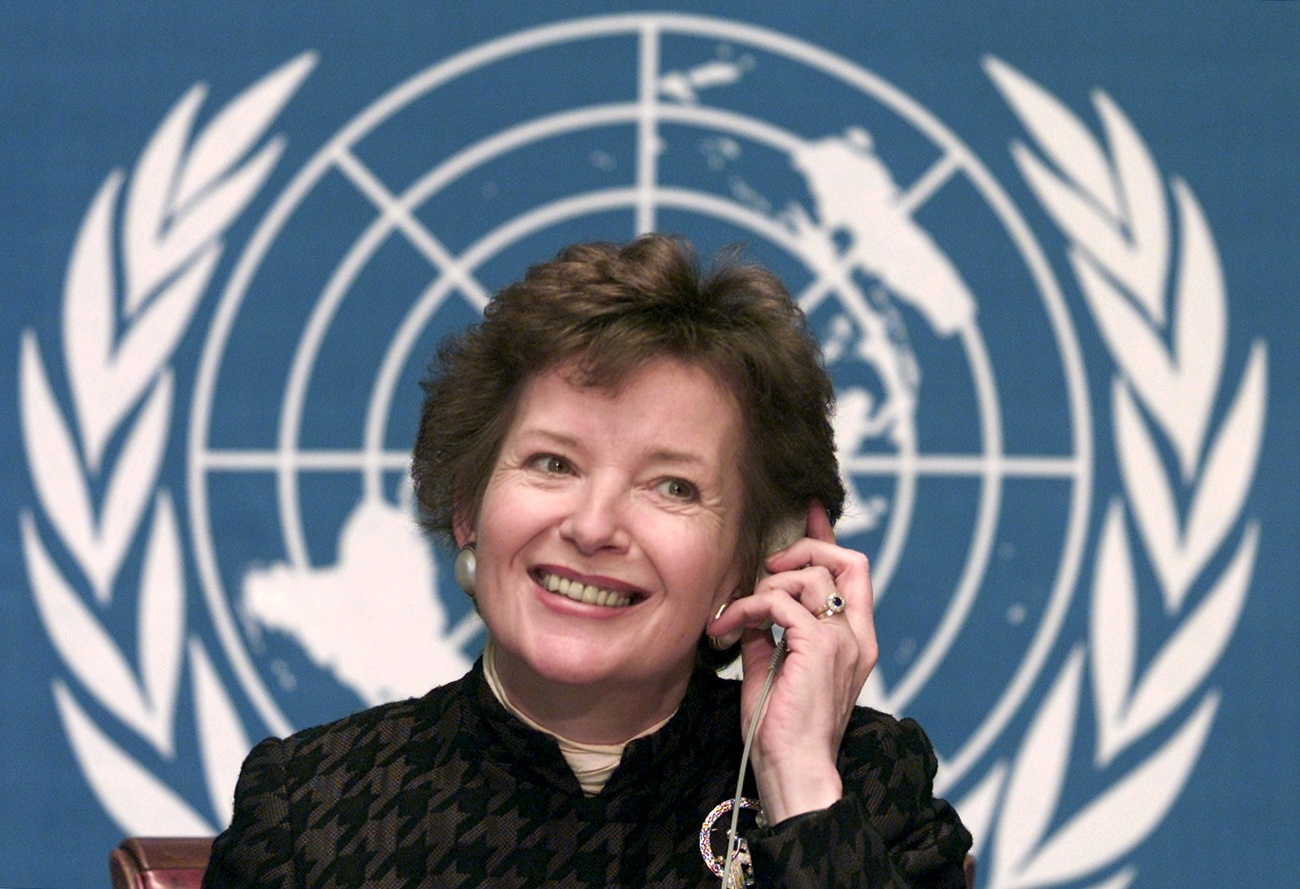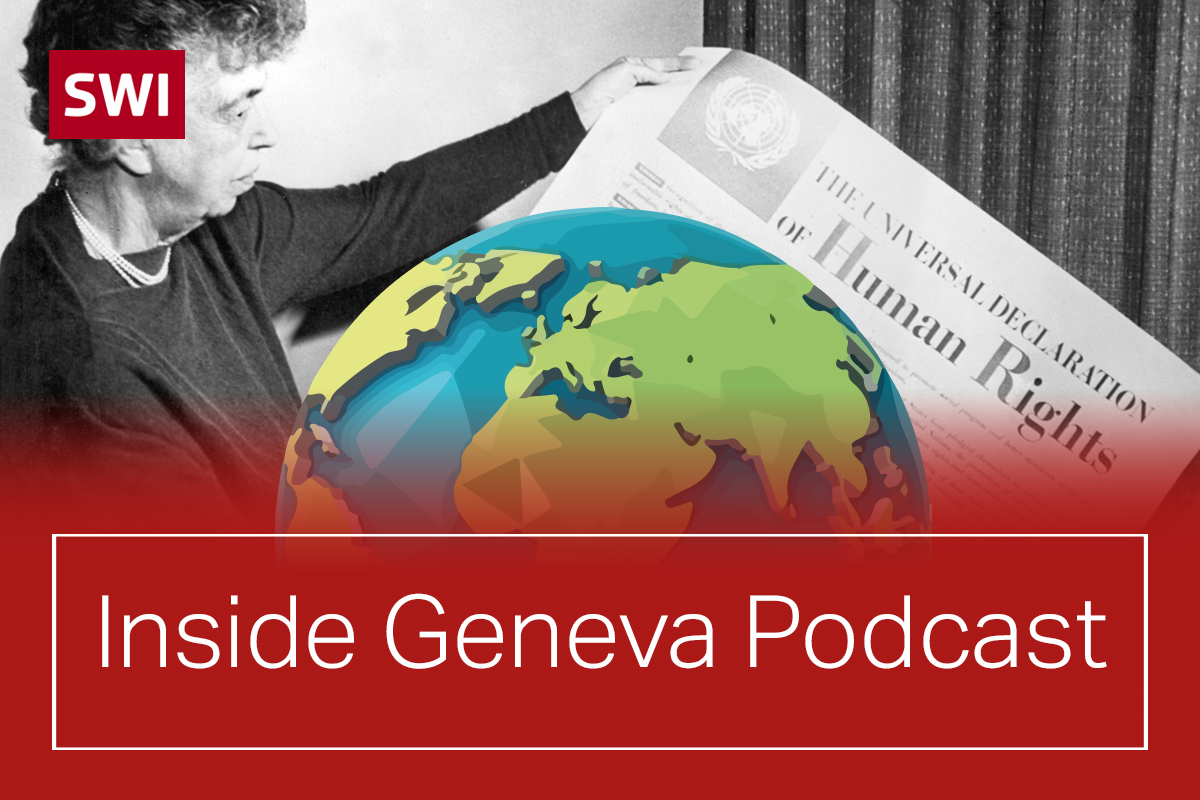
Mary Robinson, human rights champion
I’ve often thought, during my time as a Geneva correspondent, that the most thankless task at the United Nations is that of UN Human Rights Commissioner. No handing out of food parcels like at the World Food Programme, no setting up schools in refugee camps like Unicef, no vaccination programmes like the World Health Organisation.
Nothing, really, that UN member states might want, at first glance, to say thank you for. No, your job as human rights commissioner is to keep a close eye on how governments uphold, or abuse, human rights. To investigate alleged violations, including the worst atrocities, war crimes, and crimes against humanity. To tell the perpetrators you know what they’re doing and urge them to stop. You might also decide to go public, telling journalists and human rights defenders what your findings.
No wonder then, that the UN human rights commissioners report feeling lonely, misunderstood, and unappreciated.
But, on Inside Geneva, we hope to give them a voice away from the awkward politics of their time in office.
Last month we had an in-depth interview with the very first UN Human Rights Commissioner, Jose Ayala Lasso. This week we follow up with a conversation with his successor, Mary Robinson.

My friends said, ‘don’t do it’
When she took on the job in 1997, Mary Robinson already had a stellar career.
Growing up in 1950s Ireland, the only daughter among four sons, she remembers she had to develop ‘sharp elbows’. Her parents assured her she would not be treated any differently than her brothers.
And she wasn’t.
But outside the family home in Irish society, things were different.
Studying law in Dublin she argued for an end to the ban on divorce, the legalisation of contraception and the decriminalisation of homosexuality. By 1969, at age 25, she was a professor of law, and had entered politics as a member of the Irish senate.
Within the senate she continued her campaign and soon discovered that trying to legislate her ideals was very different from debating them among students at the law society.
There was “incredible outrage”, she remembers. “I was the subject of vilification, and I got letters that were very disturbing.”
Undeterred, she pressed on. She brought her ideals into parliament even taking some cases to the European Court of Human Rights. Despite the opposition, she enjoyed enormous popularity. In 1990, her popularity saw her become Ireland’s first woman president.
Experienced, used to criticism and a tireless campaigner for fundamental rights and freedoms. What better candidate could there be for the UN secretary general at the time, Kofi Annan, to pick as his next human rights commissioner?

More
Inside Geneva: human rights and those who defend them – Mary Robinson
And yet, despite her own enthusiasm, she hesitated. “All my knowledgeable friends said, ‘You know Mary, I wouldn’t take that job’”.
Humiliation, exhaustion and perseverance
However, she ignored the concerns of those in her circle and accepted the nomination.
Soon thereafter, the reservations of her friends appeared justified. Arriving in Geneva to take on a position which the UN system hadn’t quite figure out yet, she decided to make a multi -country trip to Africa. This tour included Rwanda.
There, where a genocide had only recently claimed almost a million lives, people remembered all too well the failure of the UN to prevent the violence.
Robinson, who had had previously enjoyed three welcoming visits to Rwanda as the Irish president, was not afforded that same hospitality when she arrived representing her new role. “When I arrived wearing my UN hat they completely disregarded [me], and in effect kind of humiliated me.”
Undeterred, she travelled on from Rwanda to Uganda, and then South Africa. It was during this visit that Nelson Mandela will become a good friend. Arriving back in Ireland for a holiday, she felt exhausted and demotivated. She recounts not even wanting to see her family. A warning from her brother that she was approaching burn out was a wake-up call.
“I remember feeling to myself, ‘I’m going to get on top of this somehow. This job is impossible, everything is very, very difficult, it’s extremely hard work, but somehow I’m going to get on top of it.’ And it got better.”
Some successes. Many challenges
Robinson decided the best way to promote the organisations human rights work was to visit as many countries as possible. She returned to Africa, she visited China – something most UN human rights officials at that time had been unable to do – and even Tibet.
She spoke out about the rights of migrants and about use of the death penalty in the United States. Then came an event many at the UN had long dreamed of: the World Conference against Racism, held in Durban, South Africa in 2001. This was an event where UN officials hoped the organisations could show real leadership.
Robinson had extended her mandate by a year to chair the conference. Prior to the event she made a trip to Teheran to chair a preparatory meeting.
However, it was here that the dream became something of a nightmare.
It was not her choice to hold the meeting in Iran, neither had she agreed the wording of the final document, some of which was widely regarded as anti-semitic.
In the UN’s usual tortured bureaucracy, all the contentious wording was placed in square brackets, meaning it hadn’t been agreed to. In Robinson’s view it, “would never be agreed to”.
Nevertheless, Israel was furious. And, in turn, so was the US, its closest ally. The much hoped for Durban conference, which Robinson says she “put her heart and soul into” began to unravel, and ultimately, ended in debacle: both the US and Israel withdrew from the conference.
In speaking with her for Inside Geneva, it is obvious that Mary Robinson still feels the hurt and frustration of how the Durban conference events unfolded. She was accused in some sections of the US and Israeli press of being anti-semitic herself, something she says was so far from the truth she failed to even defend herself.
The final Durban document, she maintains, was visionary, setting down principles for the UN to combat racism. Some today agree with her, but the whole Durban process remains overshadowed by the controversy which surrounded it.
Robinson left her post as UN Human Rights Commissioner in 2002, but she continues to devote herself to human rights. Now, her focus has shifted to climate change which she admits she neglected during her time at the UN.
Her message now?
“Human rights is the answer. We need to understand that everyone has these core human rights, that all human beings are born free and equal in dignity and rights. That this is who we are. I think a real understanding of the importance for human beings of our values, of human rights, of an approach of climate justice, of much more fairness and equity, gender equality, inclusiveness, non-discrimination. That world is more important than it’s ever been.”
To hear more, tune in to our latest Inside Geneva episode!

In compliance with the JTI standards
More: SWI swissinfo.ch certified by the Journalism Trust Initiative



























You can find an overview of ongoing debates with our journalists here . Please join us!
If you want to start a conversation about a topic raised in this article or want to report factual errors, email us at english@swissinfo.ch.